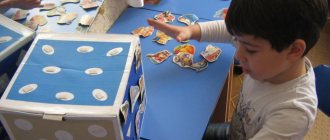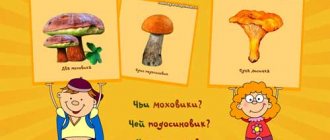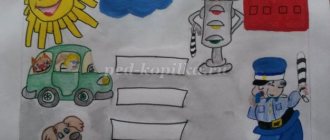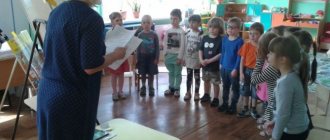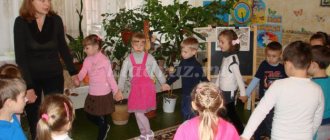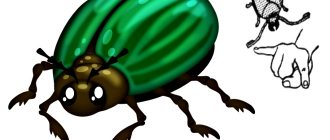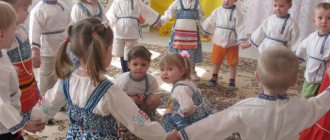Joint word games for adults and children in the preparatory group
Verbal games in older preschool age are one of the main methods of consolidating and deepening knowledge, and they need to be organized every day, gradually increasing their complexity. The teacher needs to monitor the dynamics of children’s development and mastery of new knowledge in order to give optimal load (for example, in the game “Guess the Animal” you need to add descriptions of animals of tropical countries, polar zones, and the ocean as preschoolers become familiar with them in class).
Older preschoolers also like games of a competitive nature, since their psyche is much more stable than at a younger age, they do not perceive losing as painfully as before; on the contrary, they are able to recognize and correct their mistakes. Almost any word game can be turned into a small competition or quiz, the main thing is that it is held in a friendly, comradely atmosphere, and everyone without exception receives awards at the end.
The quiz can also be used at matinees, then it will be conducted by the main game character
Table: examples of word games for seven-year-old children
| Educational area and tasks of games | Name and course of the game |
| Social and communicative development To form in children an idea of positive models of behavior in society, to cause rejection of negative qualities and actions, kindness, humanity, the ability to be friends, mutual assistance, sympathy for someone else’s misfortune. |
|
| Cognitive development (familiarization with society) Clarify and generalize children’s ideas about professions, relationships in the family, develop the ability to choose words to describe objects and people, cultivate respect for work, family and friends. |
|
| Cognitive development (familiarization with nature) To consolidate the understanding of natural phenomena and objects, the relationships between them, to cultivate environmentally appropriate behavior and ecological culture. |
|
| Cognitive development (mathematics) Improve understanding of time and space, strengthen quantitative and ordinal counting skills, and cultivate interest in mathematical games. |
|
| Speech development Strengthen children’s understanding of speech units (sound, word, sentence), improve the ability to identify sounds in words, select a word with a certain sound, and come up with sentences on a specified topic. Cultivate interest in books, reading, folklore. |
|
Progress of the game.
Children sit down so that they can put chips on the table. The teacher explains the rules of the game : “Children, now I will read you Korney Chukovsky’s poem “Confusion”
1. It will contain many fables. Try to notice and remember them. Whoever notices a fable by placing a chip will notice another fable - put a second chip next to it, etc. Whoever notices more fables will win. You can put down the chip only when you yourself have noticed the fable.”
First, a small part of this poem is read. The poem is read slowly, expressively, places with fables are emphasized. After reading, the teacher asks the children why the poem is called “Confusion”
.
Then the one who put aside fewer chips is asked to name the fables he noticed. Children who have more chips name those fables that the first responder did not notice. You cannot repeat what has been said. If the child has placed more chips than fables in the poem, the teacher tells him that he did not follow the rules of the game and asks him to be more attentive next time. Then the next part of the poem is read. It is necessary to ensure that children do not get tired, since the game requires a lot of mental effort. Noticing from the children's that they are tired, the teacher must stop the game. At the end of the game children who noticed more fables and explained them correctly
should be praised “What does anyone need?”
Purpose of the game . Exercise children in the classification of objects, the ability to name objects necessary for people of a certain profession.
Quizzes for children 6–7 years old
A quiz is a type of word game in which the host voices questions and the players give answers. Can be carried out in all educational areas. Preschoolers most often play quizzes in teams, but prizes should be given to both the winning and losing teams so that children do not lose interest in quizzing as an activity. When children name the correct answer, it is better to reinforce it by showing the corresponding picture or slide.
Table: riddle questions for a quiz on author's fairy tales
| I threw a net into the sea and caught a magic fish. (Grandfather from the fairy tale “The Tale of the Fisherman and the Fish”) | The girl is beautiful, unloved by her stepmother. I accidentally went to the ball and lost my shoe there. (Cinderella). | He is cheerful and not angry, This sweet eccentric. With him is the boy Robin, and his friend Piglet. For him, a walk is a holiday, and he has a special scent for honey. This plush prankster Bear... (Winnie the Pooh). |
| I am a wooden boy, and here is the golden key! Artemon, Pierrot, Malvina - They are all friends with me. I stick my long nose everywhere, My name is... (Pinocchio). | A boy in a blue hat, from a famous children's book. He is stupid and arrogant, and his name is... (Dunno) | While eating rolls, a guy rode on a stove. He rode around the village and married the princess. (Emelya). |
| Grandfather and grandmother lived sadly. And they blinded their daughter. She always helped them, but she avoided the fire. (Snow Maiden). | A beautiful girl found herself in the forest. She met seven dwarfs in the forest. (Snow White). | He can speak meow. He knows how to be the best friend. He helps his master and boldly eats the cannibal! (Puss in Boots). |
Photo gallery: illustrations for author's fairy tales
The image of a positive, cheerful character will cheer up children during the quiz
When showing children a picture of a hero, you can pay attention to his beautiful outfit
For children in the preparatory group, you should choose illustrations in which the characters are dressed in national costumes
This hero can even come to the children and help conduct a quiz
Fairy tales by A. S. Pushkin can be included in the quiz, but a separate game can be played based on them
The quiz should be preceded by a deep study of the topic to which it will be devoted, so that all children feel confident and comfortable.
Progress of the game.
The teacher reminds the children of the game “Who can name the most actions?”
He says: “In this game you named what actions a person of a particular profession performs.
And today we will remember what people of different professions need to work. I will call the person by profession, and you will tell me what he needs for his job.” "Shoemaker!"
- says the teacher.
“Nails, a hammer, leather, boots, boots, a car, a paw,”
the children answer.
The teacher names professions familiar to children of this group : doctor, nurse, teacher, nanny, janitor, driver, pilot, cook, etc.
If children do not lose , you can offer the opposite option. The teacher names objects for the work of people of a certain profession, and the children name the profession.
“Reads, talks, teaches to draw, sculpt, dances and sings, plays”
“, says the teacher and throws the ball to one of the players.
“Teacher
,” he answers and throws the ball to her.
In this game, as in other games where the rules provide for the ability to respond quickly, it is necessary to remember the individual characteristics of children . There are slow children. They need to be taught to think faster, but this should be done carefully. It is better to call such a child to answer first, since at the beginning of the game there is a large choice of words . The teacher encourages the child with the words: “Vitya quickly found the right word. Well done!"
It is the speed of response that is emphasized.
"Hunter"
Purpose of the game . Exercise children in the ability to classify and name animals, fish, birds, etc.
Progress of the game.
Children and teacher sit in a circle. The teacher explains the rules of the game : “Today we will come up with sentences. I will say a word, and you will quickly come up with a sentence with this word. For example, I will say the word "close"
and I’ll give Misha a pebble. He will take the pebble and quickly answer:
“I live close to the kindergarten
.
Then he will say his word and pass the pebble to the person sitting next to him.” The word in a sentence must be used in the form in which the person guessing suggests it. So, in turn (in a circle),
the pebble passes from one player to another. If children find it difficult to answer, the teacher helps them. This game is played after children have become familiar with the word and sentence.
"Say it differently"
Purpose of the game . Teach children to choose a synonym - a word that is close in meaning.
Progress of the game.
Somewhere in a free space at one end of the yard or area there is a group of people playing . This is home. At a distance of several steps from the house - the farther the better - some kind of mark is placed and a line is drawn. This is a forest where different animals live. The hunter, one of the players, goes to this forest. Standing still, he says the following words: “I’m going into the forest to hunt, I’ll hunt for.”
Here he takes a step forward and says:
“.
hare" ; takes the second step:
".
bear" ; takes the third step:
".
wolf" ; fourth step:
".
fox" ;fifth:
".
badger." . With each step the hunter names an animal. You cannot name the same beast twice. You can’t name birds either, but if you play bird hunt, you only need to name birds.
The winner is the one who reaches the forest, naming a new animal with each step. The one who could not do this returns home, and the next one goes hunting. The unsuccessful hunter may be allowed to go hunting again. Perhaps this time the hunt will be successful.
Note. Based on the principle of this game , you can play the game “Fisherman”
.
The game is played in the same way. The fisherman says: “I’ll go fishing and catch it.
pike, crucian carp, perch,” etc.
"Come up with a proposal"
Purpose of the game . speech activity and quick thinking in
Progress of the game.
The teacher, addressing the children, asks them questions, for example: “Remember what you can sew”
.
Children's answers . “Dress, coat, sundress, shirt, boots, fur coat, etc.”
.
"Darn?"
-
“Socks, stockings, mittens, scarf
.
“Should I tie it?”
-
“Shoelaces, rope, scarf, ties
.
“Push?”
-
“A cap, a scarf, a hat, a Panama hat, a peakless cap, a cap, a Budenovka
.
“Put it on?”
-
“Coat, dress, stockings, fur coat, raincoat, skirt, sundress, tights
.
The teacher names the words he has previously planned. Children give answers by choosing words that match their meaning.
"Make no mistake"
Purpose of the game . Develop quick thinking, consolidate children's knowledge of what they do at different times of the day.
Progress of the game.
The teacher says that in this game the children will have to remember words that are similar in meaning to the word that he names.
"Big"
, suggests the teacher.
Children name words; "Huge, large, enormous, gigantic"
.
"Beautiful"
—
“Pretty, good, beautiful, charming, wonderful”
.
"Wet"
—
“Damp, damp
.
Etc. When preparing to play the game , the teacher selects words in advance that have a number of synonyms.
It is better to write down these words so as not to remember them for a long time, since the game takes place at a fast pace. The teacher can, by analogy with this game, develop other games , for example: he names some noun, and the children select suitable epithets for it. So, to the word “sea”
children select epithets “calm, stormy, quiet, azure, menacing, stormy, beautiful, southern.” The child who remembers more words should be praised.
All these games can be played during a lesson in your native language (as part of the lesson)
.
"Choose a word"
Purpose of the game . To develop children's intelligence and the ability to select words that have the right meaning.
